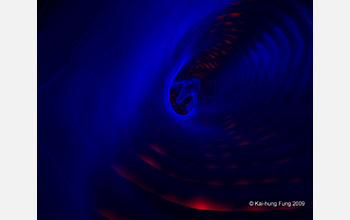Multimedia Gallery
"Sound Track," by Kai-hung Fung
"Sound Track."
This artistically rendered 3D computed tomography (CT) scan shows a view inside the human ear canal. The two tiny bones (center) are the ear ossicles known as malleus and incus marking the location of the ear drum that guards the opening to the middle ear.
This artwork was created by Kai-hung Fung, a specialist in diagnostic radiology at Pamela Youde Nethersole Eastern Hospital, Hong Kong SAR, China. Using 3D CT scans of human anatomy, Fung digitally manipulates the scans into beautiful, artistic images.
Fung received recognition for his work in 2007, when his image "What Lies Behind our Nose?" won first place in photography in the International Science and Engineering Visualization Challenge (SciVis) competition, created and sponsored by the National Science Foundation (NSF) and the journal Science. The competition seeks to promote the use of visualization as a tool in communicating science, engineering and technology to the public and for education and journalistic purposes. For more information about SciVis, including competition guidelines, entry forms and past winners artwork, see the SciVis Special Report. [See another image by Kai-hung Fung Here.] (Date of Image: 2009)
Credit: ©Kai-hung Fung 2009, Pamela Youde Nethersole Eastern Hospital, Hong Kong
See other images like this on your iPhone or iPad download NSF Science Zone on the Apple App Store.
Special Restrictions: For published material, a PDF file should be sent to Dr. Kai-hung Fung via email at khfung@ha.org.hk; or send a printed copy to his mailing address: Pamela Youde Nethersole Eastern Hospital, 3 Lok Man Road, Chai Wan, Hong Kong.
Images and other media in the National Science Foundation Multimedia Gallery are available for use in print and electronic material by NSF employees, members of the media, university staff, teachers and the general public. All media in the gallery are intended for personal, educational and nonprofit/non-commercial use only.
Images credited to the National Science Foundation, a federal agency, are in the public domain. The images were created by employees of the United States Government as part of their official duties or prepared by contractors as "works for hire" for NSF. You may freely use NSF-credited images and, at your discretion, credit NSF with a "Courtesy: National Science Foundation" notation.
Additional information about general usage can be found in Conditions.
Also Available:
Download the high-resolution JPG version of the image. (446 KB)
Use your mouse to right-click (Mac users may need to Ctrl-click) the link above and choose the option that will save the file or target to your computer.

